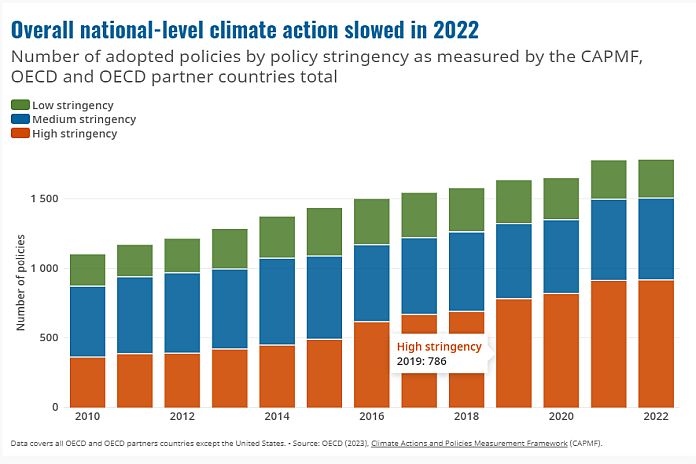PARIS, France – National climate policy action across the countries that produce nearly two-thirds of total greenhouse gas emissions only increased by 1 percent in 2022, the lowest annual growth recorded since 2000, and reflecting a deceleration in ambitions to meet the Paris Agreement temperature goals amid growing energy security concerns. In contrast, between 2000 and 2021, national climate policy action increased by an average of 10 percent a year, according to new OECD analysis of policy adoption and policy stringency of the 50 countries covered by the Climate Action and Policies Measurement Framework.
The Climate Action Monitor 2023 shows that climate action differs substantially across countries, with those with more stringent policies showing faster increases in climate mitigation action. The report also shows that, while the adoption of market-based policy instruments has slowed, actions on governance, international co-operation, targets and climate data are picking up pace.
“We cannot manage what we don’t measure. The International Programme for Action on Climate provides comparable and harmonised information to monitor national climate action and global net-zero trajectories,” OECD secretary-general Mathias Cormann said. “This year’s Climate Action Monitor shows current greenhouse gas emission targets are well below the reductions necessary to achieve the 1.5°C temperature goal. More is needed to translate ambition into real actions and real outcomes by ensuring the effective implementation of national policies – and there is no time to waste.”
The report – which for other indicators adds the United States to cover 51 countries – highlights that along with extreme weather events, 2022 recorded a sharp increase in the population exposed to extreme temperatures, from 24 percent in 1979 to 46 percent. This results in worsening agricultural droughts in a majority of OECD and partner countries, with an average decline of 2.4 percent in soil moisture, and an increase of 48 percent in exposure of built-up areas to coastal flooding in the last 20 years.
Reaching the 1.5°C Paris Agreement temperature goal would require OECD and OECD partner countries to commit to an additional aggregate emission reduction of around 30% of their current nationally determined contribution targets – at least 9,315 MT CO2e – by 2030. A total of 104 countries and the European Union have adopted or proposed net-zero targets, however only 26 countries and the EU (27 in total), representing 16 percent of global emissions, have enshrined their targets in their laws.
Identifying and understanding the full impact of these trends and events is important for assessing the final impact of climate policy on mitigation outcomes. The OECD’s Net Zero+ project continues to explore these and other key challenges, including skills shortages, the supply of critical minerals, and other potential bottlenecks to a rapid and resilient net zero transition.





